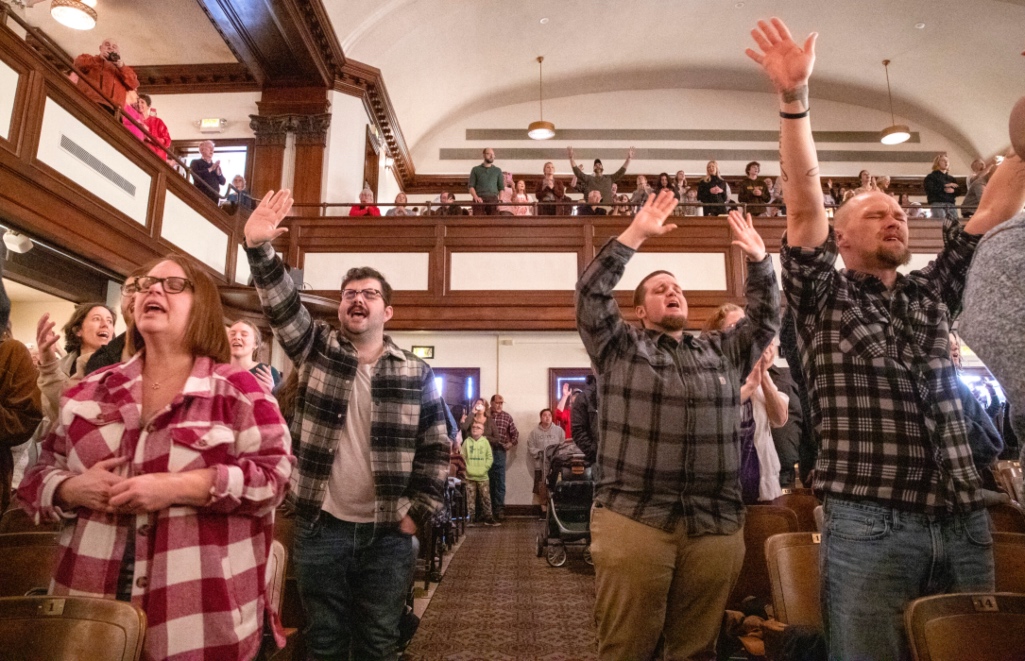
The Executive Committee of the Southern Baptist Convention (SBC) will consider a significant proposal on June 10 to establish a standing Credentials Committee. This committee will be tasked with handling disputes that arise related to whether churches are in friendly cooperation with the SBC, including concerns with churches over their handling of sexual abuse.
If this proposal is approved by the Executive Committee and then passed by a two-thirds vote at the annual meeting, the Credentials Committee will immediately become the Southern Baptist denominational body responsible for this process.
The intention of this article is to serve as a guide to help Southern Baptists and others understand the purpose and process of this proposal so that everyone can have a clearer picture as it comes up for consideration at the annual meeting.
The proposal would make substantive additions and alterations to several SBC bylaws in order to codify the changes. The proposal may be hard for some to understand because it is lengthy and uses technical language to address a variety of questions related to the process involving legal, administrative or denominational matters.
What is the proposal?
This proposal would establish a standing Credentials Committee that would be empowered to “make inquiries of a church” in instances where a dispute regarding friendly cooperation arises. This committee would now be responsible for handling issues arising from churches that act in a manner that is inconsistent with the convention’s beliefs regarding sexual abuse. The committee would not just address issues of abuse but other subjects such as homosexuality or racism, in accordance with Article 3 of the SBC Constitution.
The Credentials Committee can conduct an inquiry process in which it would “consider the matter and review any information available to it” to assess if a church is in friendly cooperation with the convention, as established in Article 3 of the SBC Constitution.
If an inquiry process is completed between annual meetings, the Credentials Committee could make a recommendation to the Executive Committee who would then “determine whether the church is in cooperation with the Convention.” While the convention and the Executive Committee retain their authority to make final determinations regarding whether a church is in cooperation with the convention, this committee is authorized to assess and recommend action to the larger body.
What is the purpose of the proposal?
The purpose of this proposal is to establish a stand-alone committee that is empowered to assess and address issues that could warrant disfellowshipping a church. It attempts to comprehensively address the composition and purpose of this committee.
As J.D. Greear described in comments to Baptist Press, “This committee would be charged with handling any issues that may arise as to whether a church is in cooperation with the SBC, including (but not limited to) complaints of sexual abuse.” Greear is the SBC president and pastor of The Summit Church in Raleigh-Durham, N.C.
The proposal is a proactive step taken by the Executive Committee to position the convention to more effectively address the abuse crisis. The Credentials Committee would carry out responsibilities currently handled by the bylaws workgroup of the Executive Committee.
Is this proposal a good idea?
Yes, it is an encouraging next step to address the Southern Baptist abuse crisis. The Executive Committee has sought to establish a process that fosters transparency and accountability while operating within the unique polity of the SBC. This decision places the convention in line with approximately half of all state conventions that have some type of standing credentials committee.
Survivors, advocates and all Southern Baptists should be heartened by this initial step, even as they await clarity about the committee’s inquiry process. It would fulfill one of Greear’s 10 calls to action on abuse and aligns well with the ongoing work of the Sexual Abuse Advisory Group.
What are the main concepts in the proposal?
The proposal includes the following primary concepts:
- Responsibilities: This committee will “make inquiries of a church” and issue recommendations regarding friendly cooperation, in accordance with specific processes.
- Standing committee: In contrast to the current iteration of the Credentials Committee that focuses on issues of messenger registration at the annual meeting, this standing committee would operate throughout the year and focus on disputes regarding friendly cooperation.
- Composition: This committee would consist of nine members “composed of the registration secretary, the chair of the Executive Committee, three members nominated by the Executive Committee, and four members nominated by the Committee on Nominations.”
- Term: Committee members other than the registration secretary and chair of the Executive Committee would serve a term of three years and not be eligible for re-election until one year elapsed.
- Messenger approval of members: All committee members would be elected at some point by the messengers.
- Appeals process: The proposal creates an appeals process for churches to the SBC while in session at an annual meeting.
- Autonomy: The proposal respects the autonomy of churches while empowering the committee to conduct an inquiry process.
- Inception: The committee would be created immediately after 2019 SBC annual meeting in Birmingham, Ala.
- Registration committee: The proposal would also rename and repurpose the existing credentials committee in a separate registration committee to handle issues of messenger registration at the annual meeting.
What does this proposal not do?
While this proposal would address a number of key issues, there are several things it does not do:
- The proposal does not authorize the Credentials Committee to “clear” churches. The purpose of the committee is to assess disputes over a church’s friendly cooperation with the convention. It is not tasked with certifying or clearing churches to affirm that they are in friendly cooperation.
- The proposal does not address how to handle any SBC entities other than cooperating churches. Other Southern Baptist organizations such as entities, state conventions, etc., have their own trustee boards who are responsible for handling this issue.
- The proposal does not address pending inquiries. The proposal is not intended to address any inquiries of churches that have occurred or are currently pending. Instead, it would establish that any inquiries would now be handled by the Credentials Committee instead of the Bylaws Workgroup of the Executive Committee.
- The proposal does not establish the committee’s inquiry process. While the proposal provides extensive detail about many key elements, it does not prescribe how the committee will conduct its inquiry process. This likely means that, once the committee is constituted, one of its top priorities will be to establish its inquiry process.
Are there any areas of potential confusion in the proposal?
Because this is a long, complex proposal, there are a few spots that could create confusion:
- Does the proposal authorize secrecy to minimize transparency? Some may be concerned by the language in section 8.C.1 that states, “Meetings and reports of the committee may be private or public in order to maintain the degree of confidentiality which is appropriate under the circumstances…” The purpose of this provision is not to create a shroud of secrecy to minimize transparency. Instead, it is to protect confidentiality that is fitting for the best interests of the convention, churches, and others involved in the process, such as survivors in the case of an inquiry related to sexual abuse.
- Does the proposal create a fair appeals process where people on all sides can speak into the debate? Some may be concerned by the language in section 8.C.2 that states, “One representative of the church under consideration and one representative of the Credentials Committee shall be permitted to speak to the question, subject to the normal rules of debate.” The purpose of this provision is to ensure that messengers will hear from the church and from the committee, but it does not foreclose the possibility of additional messengers speaking for or against the issue in accordance with the normal rules of debate.
- Does the proposal limit the scope of the committee’s inquiry process? Some may be concerned by the language in section 8.C.5 that states, “The committee may make inquiries of a church, but shall never attempt to exercise any authority over a church through an investigation or other process that would violate Article IV of the Constitution.” This provision does not limit the scope of how the committee can conduct its inquiry process; nor does it prevent or discourage law enforcement investigations from occurring. Instead, it conveys that, by nature, this committee is not an investigative body while also ensuring that the committee will respect local church autonomy while conducting its inquiry process.
What happens from here?
This proposal will be taken up by the Executive Committee at its meetings in Birmingham and then be presented to the messengers for deliberation and a vote at the annual meeting. This proposal would require approval from the Administrative Committee of the Executive Committee before coming before the full board for approval on Monday, June 10. Upon approval, it would be presented to the messengers on Tuesday, June 11, for deliberation and a vote.
As a bylaw amendment, this proposal would require a two-thirds vote from the messengers to pass. If it passes, the credentials committee would be immediately constituted at the adjournment of the annual meeting. Then, the Credentials Committee would be responsible for developing its own inquiry and administrative processes as it begins to carry out its responsibilities.
What else is happening related to abuse in conjunction with the SBC annual meeting?
In addition to this important Credentials Committee proposal, there are several other significant things happening related to abuse in conjunction with the SBC annual meeting.
- A proposal for a simplified constitutional amendment: A recent Baptist Press report also explains that the Executive Committee will consider and present a simplified version of the constitutional amendment it voted on in February. The updated version eliminates the four criteria specified in the original amendment in order to allow for broader application of the amendment language. The new language states: “The Convention will only deem a church to be in friendly cooperation with the Convention, and sympathetic with its purposes and work (i.e., a ‘cooperating’ church as that term is used in the Convention’s governing documents) which: (4) Does not act in a manner inconsistent with the Convention’s beliefs regarding sexual abuse,” and “(5) Does not act to affirm, approve or endorse discriminatory behavior on the basis of ethnicity.” A constitutional amendment would require a two-thirds approval of messengers at both the 2019 and 2020 SBC annual meetings.
- “Sexual Abuse and the Southern Baptist Convention”: The Sexual Abuse Advisory Group and the ERLC are partnering together to host over 1,000 attendees for a candid conversation about Sexual Abuse and the Southern Baptist Convention. This event, featuring Rachael Denhollander, Beth Moore, Russell Moore, J.D. Greear, and Susan Codone, will cover wide-ranging issues related to the abuse crisis in the SBC.
- Becoming a Church that Cares Well for the Abused curriculum: The new, free video-based curriculum produced by the Sexual Abuse Advisory Group in partnership with LifeWay will debut at the annual meeting. This curriculum is designed to equip churches to care well for abuse survivors.
- Sexual Abuse Advisory Group Report: On Wednesday afternoon, the Sexual Abuse Advisory Group will facilitate a time of prayer and lament as well as issue a report on the subject of Southern Baptist sexual abuse. This report will highlight the ongoing work of the advisory group and look ahead to the future.
(EDITOR’S NOTE – Phillip Bethancourt is executive vice president for the Ethics & Religious Liberty Commission. This article first appeared at ERLC.com. Used by permission.)


